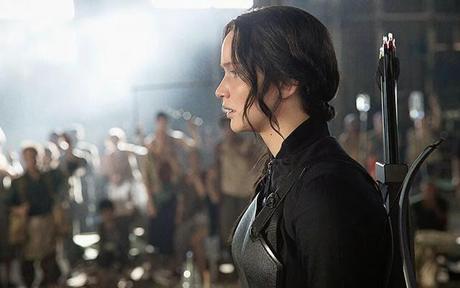 Are you, are youComing to the treeWhere I told you to run,So we'd both be free.
Are you, are youComing to the treeWhere I told you to run,So we'd both be free.The Hanging Tree
No one knows where the ladder goesYou're gonna lose what you love the mostYou're not alone in anythingYou're not unique in dying
The Ladder Song
At the end of Catching Fire, Katniss Everdeen was lifted out of the arena of her second Hunger Games, and discovered that others have plotted about her fate behind her back and determined a path for her without her knowledge. This is one of the most haunting aspects of this series - the fact that Katniss, a fiercely independent character who constantly struggles with the expectations that others have of her, loses control so utterly of her own life, loses the ability to make her own choices. The very same features that make her so attractive for the position of the icon of this revolution, managed by District 13 but spreading through Panem, are also the reason why she is so reluctant to actually follow what others tell her to do. It speaks to her resourcefulness that she realizes early how little control she is, and that she needs to use what leverage she has in her new position to protect the people she loves. She doesn't want to be the Mockingjay for District 13's President Coin (Julianne Moore) and her brilliant chief of propaganda Plutarch Heavensbee (Philip Seymour Hoffman), who was so recently an enemy, but there is also no longer a habitable world outside of the confines of the (very effectively claustrophobic) underground tunnels of 13, so she has to make compromises. Katniss doesn't have an interest in explicit politics, in ideology. She understands the genocidal terror of the Capitol because she has seen the remains of her home (she has been made to see them, to make her more likely to comply). She understands that Peeta, captured by the Capitol because Coin and Heavensbee failed to extract him from the arena (like Johanna), is in danger from all sides, since he is being used for propaganda purposes by the other side. The film hints at deeper questions here - if both District 13 and the Capitol are willing to use human beings as propaganda tools, what really differentiates them, what does it mean that Coin is so very conscious of the sacrifices and compromises that victory demand that she truly believes that individuals mean nothing in the face of the struggle (everyone is replaceable, except the one person that she cannot replace, Katniss). But Katniss doesn't really base her decisions on deeper questions of political analysis, she makes them out of an instinctual drive to protect the people that she loves, to keep her mother and her sister (and the cat) safe in 13, to ensure that Peeta, in spite of the things he is saying on television, will be freed and pardoned.This is what she trades for her freedom, and once she does, the propaganda mills start to turn and we see how perfectly oiled that machinery is, how desperate 13 is for a face to brand the revolution. Katniss isn't very good at it because she is inherently incapable of performance. She knows how to do it when her own life or that of a loved one is immediately at stake (how she saved herself and Peeta at the end of her first Games showed how apt she can be at reading a situation and understanding media), but the reason why she resonates emotionally with so many people is because she isn't a performer, her actions are authentic. She resonates because there was no calculation in volunteering as a tribute or mourning Rue. Heavensbee, and his rugged film team (professional and pragmatic, seeing an opportunity in every genuine moment), have to find a way to generate that authenticity somehow, because Katniss is useless otherwise.The question of Gale vs. Peeta, never particularly interesting in and of itself, makes sense when viewed through the lens of Katniss' struggle with herself: Gale is still connected to the idea of simply running away and leaving all of it behind, being self-sufficient in the woods, away from the politics of 13 vs. the Capitol. This opportunity is now closed to her, because Gale, as was hinted from the beginning, is very much a character that thinks in political terms, that is very much connected to the struggle, to the extent that there is now a new "we" that doesn't necessarily include Katniss. Peeta is someone who intimately comprehends her trauma (nobody except Haymitch does, and she still resents Haymitch for plotting behind her back) that threatens to completely incapacitate her, but he isn't available to her because the Capital has captured him and is imposing its own interpretation of their story on the public (and at the end, it is revealed that he is lost to her in a much more severe and immediate sense beyond his capture). Mockingjay strays from the confines of Katniss' perception more often than the other films, it puts more focus on how the Districts choose to rebel (with unimaginable losses), crash against the walls of the Capitol. It hints at the workings of 13, and paints a stark compromise between the capitalist individualism of the Capitol (which stays afloat through exploiting others and keeping its own populace ill-informed and well-entertained) and the idea of uniformity, of everyone just being a cog in the wheel towards liberation (self-exploitation, rationing, strict rules), that dominates 13 (as much as Effie doesn't comprehend, Coin makes a deliberate choice with her plainness). Katniss is forced to navigate this mostly by herself, with nobody to counsel her who doesn't have some kind of stake in her decisions - Finnick perhaps comes closest, but he is completely caught up in dealing with having potentially lost the one person who kept him alive. For a film that portrays the workings of propaganda (which is essentially storytelling), Mockingjay refuses to follow the conventional structure of a film - that might be a shortcoming, a necessary fault in a film that mainly sets up things to happen next time - but it also works, because it's exactly what is happening to Katniss. The thing that provided that conventional structure in the past films were the Games themselves, shaped for the consumption of an audience, with dramatic moments and a cathartic ending, but the revolution in Panem, the dominating force at play now, isn't following such structures, and the main question for Katniss' future is how quickly she will learn to read the politics of the struggle, find a place in it that doesn't take away all her agency and leaves her to be moved like a pawn by others.
2014, directed by Francis Lawrence, starring Jennifer Lawrence, Jeffrey Wright, Julianne Moore, Philip Seymour Hoffman, Woody Harrelson, Elizabeth Banks, Natalie Dormer, Josh Hutcherson, Liam Hemsworth, Donald Sutherland, Sam Claflin, Paula Malcolmson, Stanley Tucci, Willow Shields.

